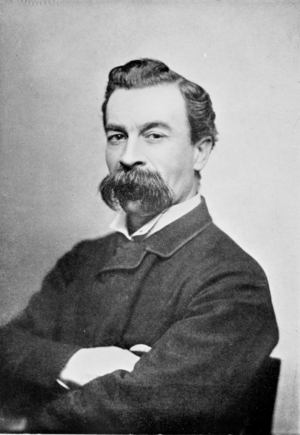Harry Marshall Ward facts for kids
Quick facts for kids
Harry Marshall Ward
|
|
|---|---|
 |
|
| Born | 21 March 1854 Hereford |
| Died | 26 August 1906 |
| Alma mater | |
| Occupation | Mycologist |
| Employer | |
Harry Marshall Ward (born March 21, 1854 – died August 26, 1906) was a very important British scientist. He studied plants, fungi, and plant diseases. He was one of the first scientists to look at how plant diseases affect plants at a very detailed, scientific level. He was also a FRS and a Fellow of the Linnean Society (FLS).
Contents
Early Life and Education
Harry Ward was born in Hereford. He was the oldest child of Francis and Mary Marshall Ward. He went to school at Lincoln Cathedral around 1864. Later, in 1874, he started studying science at the South Kensington Science and Art Department. Here, he learned from a famous scientist named Thomas Henry Huxley.
In 1875, Harry went to Owens College in Manchester. Then, from 1876 to 1879, he studied at Christ's College, Cambridge. A wealthy student, Louis Lucas, helped pay for his studies at Cambridge. Harry did very well, earning top honors in Natural Sciences. He also got to study with leading German botanists, Julius von Sachs and Anton de Bary. These scientists were far ahead in the field of experimental botany at the time.
Investigating Coffee Rust in Ceylon
From 1880 to 1882, the British government sent Harry Ward to Ceylon (which is now Sri Lanka). His job was to study a serious disease called coffee rust. This disease was destroying the coffee plants on the island.
Harry worked very carefully and methodically. His research made him famous as a plant pathologist (someone who studies plant diseases) and a physiologist (someone who studies how plants work). Even though he couldn't stop the coffee rust at that time, his work was very important for future solutions. He suggested that farmers should not plant only one type of coffee plant. He also recommended planting different kinds of coffee and growing trees between plantations. This would help stop disease spores from spreading in the wind. However, many farmers had already planted only one type of coffee everywhere.
Family Life and Career Steps
In 1883, Harry Ward returned to Owens College as a teacher. He married his fiancée, Selina Mary Kingdon, who had waited for him for many years. They had two children: a daughter, Winifred Mary Ward, born in 1884, and a son, Francis Kingdon Ward, born in 1885.
In 1885, Harry became a Professor of Botany at the Royal Indian Engineering College. This college had a forestry department and is now part of Brunel University. He moved with his family to a house in Englefield Green.
Harry also became a member of several important scientific groups:
- In 1886, he became a Fellow of the Linnaean Society (F.L.S.).
- In 1887, he became a Fellow of the Royal Horticultural Society (F.R.H.S.).
- In 1889, he became a Fellow of the Royal Society (F.R.S.).
He was also the president of the British Mycological Society in 1900 and 1901.
Influence and Contributions
A lot of Harry Ward's work was influenced by his early teacher, W.T. Thiselton-Dyer. It was Thiselton-Dyer who suggested Harry for the job in Ceylon. He also helped Harry get his first teaching job at Owens College. Thiselton-Dyer even encouraged Harry to research how ginger beer is made. He also helped Harry become a member of the Linnaean Society.
In 1895, Harry Marshall Ward became the Professor of Botany at Cambridge University. This was his old university. The department needed a lot of work because it had not been well looked after by previous professors. Harry worked incredibly hard to improve the teaching and the facilities. His efforts led to a brand new building, designed exactly how he wanted it. King Edward VII and Queen Alexandra opened the new building on March 1, 1904.
Harry continued to receive honors and join important committees. He kept doing his research, teaching, and managing the department. All this hard work affected his health. He also had diabetes, which made him weaker. He passed away on August 26, 1906, when he was only 52 years old.
Harry Marshall Ward is buried in the Parish of the Ascension Burial Ground in Cambridge, next to his wife. His friend, Sir Francis Darwin, is also buried there.
 | Selma Burke |
 | Pauline Powell Burns |
 | Frederick J. Brown |
 | Robert Blackburn |

